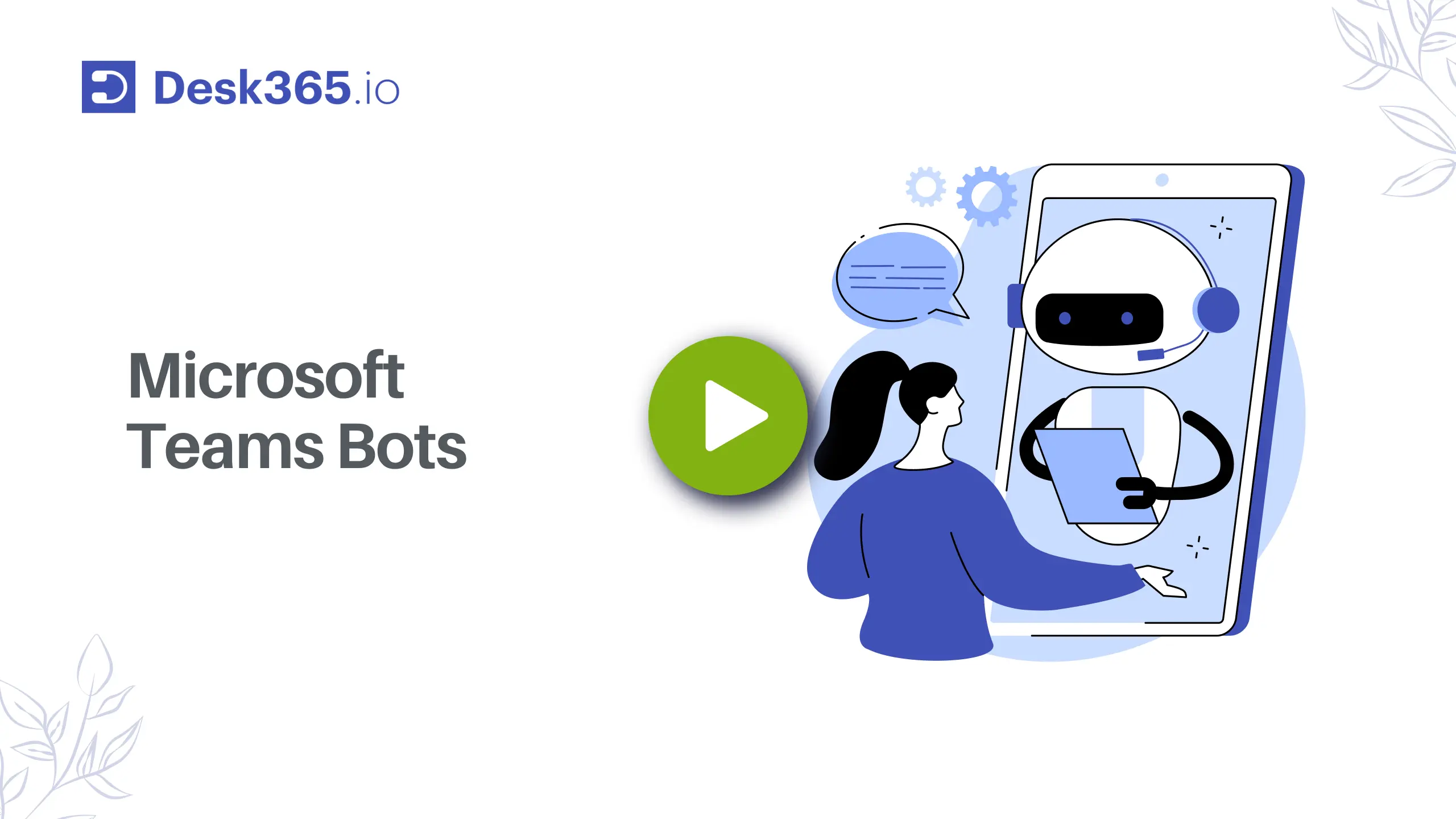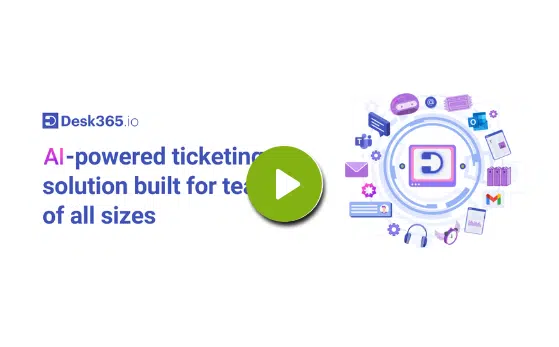Most customers prefer not to interact with support agents when resolving issues. They find it more convenient to handle problems on their own, which also provides them with a sense of freedom. Therefore, businesses need to balance assisting both new users and those already familiar with the helpdesk system.
However, integrating a customer self-service portal into customer support operations can be challenging. Fortunately, helpdesks have simplified this process by enabling users to resolve support tickets independently through self-service customer portals. These portals provide end users with immediate access to the solutions they need.
A self-service portal empowers your customers to resolve their issues without needing to call the support team or wait for an email response. In this blog post, we will explore the benefits of implementing a customer self-service portal, the various types of self-service portals, and the top helpdesk software solutions that offer the best self-service portal features.
What is a customer self-service portal?
A customer self-service portal is an online platform designed to empower end users by allowing them to independently find and utilize the information they need to address their issues, without requiring assistance from a support representative. This portal is structured to be convenient and user-friendly, providing users with the ability to manage their interactions with the helpdesk more effectively.
The primary objective of offering a customer self-service platform is to enhance the user experience by giving them control over their support interactions. This not only facilitates quicker resolution to their problems but also optimizes the time and resources of the service agents. By enabling users to solve their issues promptly, the portal reduces the workload on the support team, leading to overall increased efficiency and satisfaction for both users and support personnel.
Why should you use a customer self-service portal?
There are several great reasons to use a customer self-service portal for your business. One of the biggest benefits is that it helps reduce the number of support tickets your team needs to handle. By giving customers the tools to solve common issues themselves, your support agents can focus their time and energy on solving more complex problems.
A self-service portal also significantly improves the overall customer experience. It allows customers to find quick answers to their questions without waiting for a response. This not only saves them time but also shows that you care about providing them with a smooth and efficient support process.
In short, a self-service portal helps customers get what they need faster while enabling your support team to work more efficiently—creating a win-win situation for everyone.
The importance of using a customer self-service portal
Customers are an invaluable asset for any business, and ensuring their satisfaction is crucial for maintaining a robust customer base. A customer self-service portal allows customers to resolve issues independently, thereby reducing their likelihood of dissatisfaction. By implementing such a portal, you not only demonstrate your commitment to customer satisfaction but also show respect for your customers. This approach can significantly differentiate you from competitors. Let’s delve into the key benefits of using a customer self-service portal.
24/7 support access
A customer self-service portal provides users with the necessary resources to address their issues all by themselves. Even when support agents are unavailable, users can utilize the self-service portal to find immediate solutions to their problems. This feature enables you to offer global support, regardless of the time zones in which your support agents operate.
Reduces customer service costs
The implementation of a self-service portal decreases the volume of incoming support tickets. Consequently, this reduction can lead to a smaller support team, thus lowering the overall costs associated with customer service.
Enhances agent productivity
With fewer incoming tickets to manage, support agents can dedicate more time to resolving complex issues. This shift allows agents to avoid repetitive tasks and focus on more challenging problems, thereby enhancing agent productivity and job satisfaction.
Improves customer satisfaction
Customers appreciate the ability to solve issues on their own, which reduces frustration and eliminates the need to contact support for minor problems. Access to immediate answers through a comprehensive knowledge base not only enhances the customer experience but also increases customer loyalty and retention.
Competitive advantage
In today’s market, a self-service portal is a critical feature that many customers expect. To remain competitive and attract customers, a robust self-service portal is essential.
Hence, a customer self-service portal is an integral tool for modern businesses. It ensures continuous support availability, reduces operational costs, boosts agent productivity, enhances customer satisfaction, and provides a competitive edge in the marketplace. Implementing such a portal can significantly contribute to the long-term success and sustainability of your business.
Types of customer self-service portals
Knowledge base
A knowledge base is one of the most essential components of a self-service portal. It serves as a centralized repository containing comprehensive information about a product or service. Accessible to both end-users and support agents, a well-maintained knowledge base can also support multiple languages, enhancing its usability for a global audience. Typical resources included in a knowledge base are troubleshooting guides, how-to videos, and frequently asked questions (FAQs), all of which provide valuable assistance to users seeking to resolve issues independently.
Customer support portal
A customer support portal functions as an online hub where users can independently raise and manage support tickets. In addition to providing access to self-help resources such as the knowledge base, a support portal allows users to submit and track their support requests. The portal’s appearance can be customized to align with brand guidelines, offering a cohesive user experience. This feature not only streamlines the support process but also empowers users to take control of their support interactions.
FAQs
The frequently asked questions (FAQs) section of a support portal offers concise answers to common queries, enabling users to find solutions on their own. This reduces the demand for assistance from support agents. An effective FAQ section might cover a variety of topics, including getting started with the product, how-to questions, and explanations of product features or services. By addressing common concerns, the FAQs section helps improve user satisfaction and efficiency.
Forum
A forum provides a platform for customers to discuss their experiences and collaborate on resolving issues. Users can post questions and receive responses from both experts and fellow customers, fostering a sense of community and shared knowledge. Forums are particularly effective in building brand loyalty and community engagement, as they allow users to learn from each other and share insights. This communal approach not only enhances the customer experience but also contributes to the overall value of the self-service portal.
Chatbot
Chatbot is an AI-powered virtual assistant designed to handle a wide range of customer queries. They function as customer service representatives, engaging in simple conversations to help customers resolve issues independently, rather than waiting for a live agent.
Leveraging natural language processing (NLP) and machine learning, chatbots can understand and interpret user inputs to provide accurate and timely responses. They are capable of handling repetitive tasks such as answering frequently asked questions, guiding users through troubleshooting steps, and providing information about products and services.
Additionally, chatbots can operate 24/7, offering consistent support and improving overall customer experience by ensuring immediate assistance at any time. By automating routine inquiries, chatbots not only enhance customer satisfaction but also free up human agents to focus on more complex and nuanced issues, thereby increasing the efficiency and productivity of the support team.
What makes a good customer self-service portal?
Ease of use
A self-service portal should be intuitively designed, ensuring that users can navigate and find the necessary information without the need for complicated software installation. The interface should be straightforward, enabling users to quickly access and utilize the resources they need. An easy-to-use portal minimizes frustration and maximizes efficiency for the end user.
Powerful search capability
A robust search feature is essential for an effective self-service portal. Users should be able to easily find information by typing in keywords, with the search function offering predictive suggestions and displaying relevant results. This capability enhances the user experience by making it quicker and simpler to locate the needed information.
Content classification
Organizing content into well-defined categories is crucial for a self service portal. This structure allows users to browse through different sections and find information logically grouped by topic. Additionally, support agents should have the flexibility to easily rearrange articles and update categories as needed, ensuring that the content remains organized and relevant.
Simple language
The language used in a self-service portal should be clear and simple, avoiding technical jargon that may confuse users. Content should be written in a way that is easily understandable to the average user, ensuring that they can effectively use the portal without requiring additional assistance. This user-friendly approach enhances the accessibility and usability of the portal.
Ability to analyze
Continuous improvement of self-service content is essential. Regularly collecting and analyzing feedback from users helps in identifying areas for enhancement. This feedback can be gathered through customer satisfaction surveys and other forms of user interaction. By understanding and addressing customer needs, you can ensure that the self-service portal remains effective and relevant.
A good customer self service portal combines ease of use, powerful search capabilities, organized content classification, simple language, and a robust feedback analysis system. These elements together create a user-friendly platform that empowers customers to resolve their issues efficiently and independently, ultimately leading to higher satisfaction and loyalty.
9 best customer self-service portal solutions
There are numerous customer self-service support portals available, but businesses need to choose the right one that best meets their customers’ needs. Here are some of the top customer self-service software to consider:
1. Desk365
Desk365 offers a robust suite of self-service options designed to empower customers and enhance their support experience. As a modern, omni-channel ticketing system, Desk365 is packed with features that streamline customer service and encourage self-sufficiency. Below, we explore the key self-service features of Desk365 in detail.
Internal knowledge base
Desk365 includes an internal knowledge base that allows you to create and share solution articles with ease. This feature is particularly useful for training new agents, as articles can be reviewed, refined, and published internally. By restricting visibility to only your agents, Desk365 ensures that your support team has access to a wealth of information that can be used to solve customer issues efficiently. This internal repository acts as a dynamic training resource, continuously updated to reflect the latest solutions and best practices.
Recommended Reading: How to Set Up Knowledge Base in Microsoft Teams?
Solution articles
The platform enables the creation and dissemination of solution articles through the knowledge base. These articles are crafted to address common issues and provide step-by-step guidance. Desk365 allows you to make selected folders of these articles public, so customers can access them directly via the support portal. This self-service approach empowers customers to find answers independently, reducing the need for direct intervention by support agents and enhancing customer satisfaction.
Versions in knowledge base
Desk365 also includes a feature for managing versions of knowledge base articles. This ensures that all information remains current and accurate, as you can update and review different versions of articles before making them public. This version control is crucial for maintaining the integrity and reliability of the information shared with both customers and support agents. By keeping a detailed history of changes, Desk365 helps in tracking the evolution of articles and ensures that the most up-to-date solutions are always available.
Multi-brand knowledge base
One of the standout features of Desk365 is its multi-brand knowledge base capability. This feature allows you to create unique help-center portals tailored to different customer segments. By organizing solution articles into distinct folders for different customer groups, you can ensure that each segment has access to relevant and specific information. This personalized approach not only improves the customer experience but also ensures that your support resources are used effectively.
Customer support portal
Desk365’s customer support portal provides a comprehensive, web-based interface where customers can manage their support interactions. Through this portal, customers can create and track tickets, access solution articles from the Knowledge Base, and find answers to their queries. The portal is fully customizable according to your brand guidelines, ensuring a consistent and professional appearance that aligns with your corporate identity. This seamless integration of branding and functionality enhances the user experience and reinforces brand loyalty.
Empower customer self-service with Desk365
2. Zoho Desk
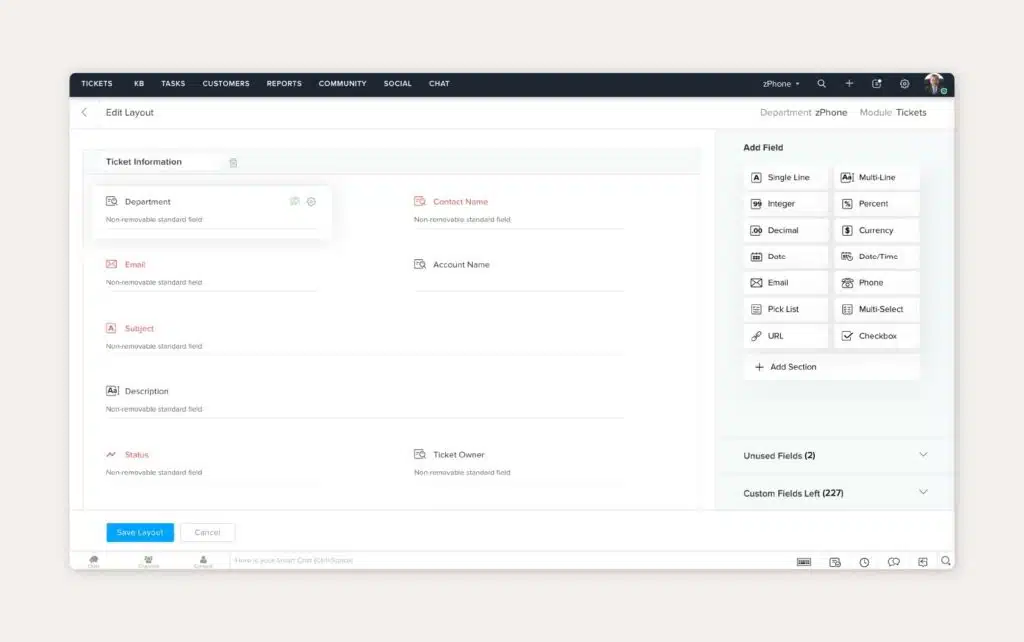
Zoho Desk provides a comprehensive self-service solution designed to empower DIY customers by enabling them to find quick answers independently, wherever they are. One of its standout features is Guided Conversations, a low-code platform that allows businesses to easily configure self-service experiences for both customers and service teams. This platform streamlines the process of building interactive and intuitive support workflows.
The self-service capabilities of Zoho Desk are further enhanced by its embeddable options. With the ASAP plugin, businesses can integrate self-service functionalities directly into their websites and mobile apps, ensuring that customers have easy access to support resources at their fingertips. Additionally, Zoho Desk supports a Multi-Brand Help Center, allowing businesses to create distinct self-service portals tailored to the unique needs of each brand’s customer base.
Zoho Desk also fosters community building, enabling businesses to cultivate and grow a vibrant community of customers, prospects, and visitors. This community aspect encourages users to engage with each other, share insights, and collaboratively solve problems. The Knowledge Base feature complements these efforts by providing a well-organized repository of solutions for commonly asked questions, ensuring that customers can quickly find the information they need without additional support.
Key features of Zoho Desk’s self-service options include:
- AI-powered bots for intelligent assistance
- a powerful search engine for quick information retrieval
- ability to customize support for different audiences, regions, or brands
3. Freshdesk
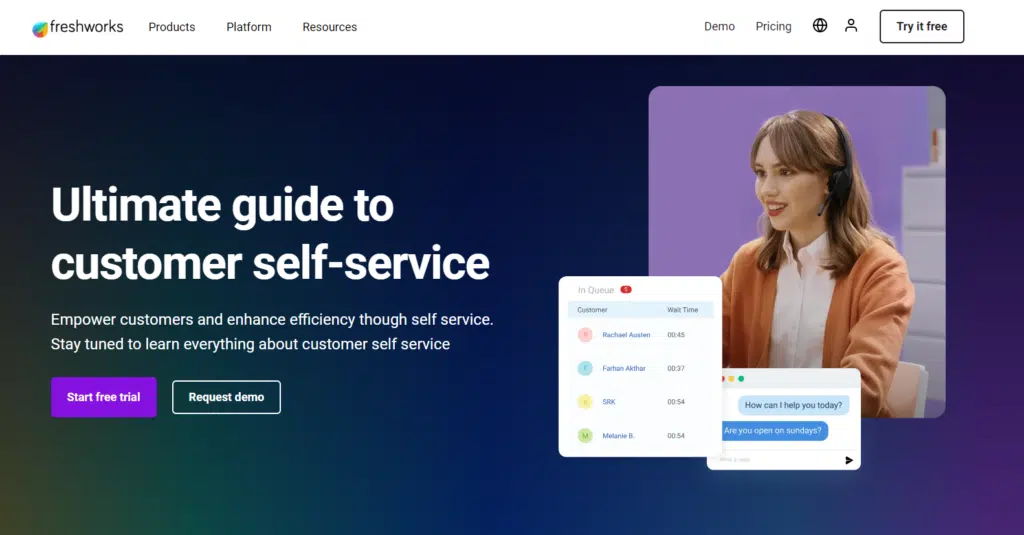
Freshdesk is a cutting-edge solution designed to empower customers with the tools they need to resolve issues independently. With a comprehensive knowledge base, intuitive AI-powered chatbots, and multichannel support, Fresh Desk streamlines the customer support process, ensuring fast and efficient problem resolution.
The platform’s user-friendly interface and mobile accessibility make it easy for customers to navigate and find the information they need, whether they’re accessing support from a desktop computer or a smartphone. By prioritizing customer autonomy and convenience, Fresh Desk enhances the overall support experience, driving satisfaction and loyalty.
Kay features of Fresh Desk’s self-service platform include:
- Extensive Knowledge Base: Create and manage comprehensive self-service content, including FAQs, troubleshooting guides, and tutorials.
- AI-Powered Chatbots: Implement chatbots to handle routine queries and provide instant responses, guiding users through basic tasks.
- Mobile Optimization: Prioritize mobile accessibility to accommodate users accessing support on smartphones and tablets.
- AI-Powered Analytics: Track user interactions, identify popular queries, and measure the effectiveness of self-service content using AI-driven analytics tools.
4. Bold Desk
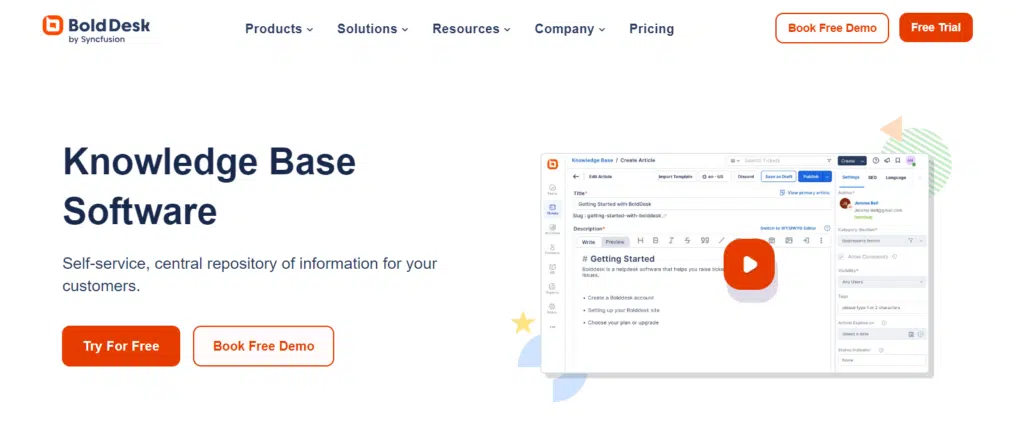
Bold Desk‘s self-service platform offers a robust solution for organizations seeking to streamline customer support and empower users with easy access to information. With its comprehensive knowledge base software, Bold Desk enables businesses to create, organize, and manage a centralized repository of resources, including FAQs, how-to articles, and learning materials. Users can quickly search for and access relevant information independently, thanks to powerful features such as instant search, auto-suggest, and tagging.
Bold Desk also prioritizes collaboration and engagement through features like comments, private notes, and @mentions, facilitating seamless communication and knowledge sharing among support teams.
Key features of Bold Desk’s self-service platform include:
- Unlimited article creation, workflow management, and powerful article editing capabilities.
- Users can organize content with categories and sections, customize article templates, and track engagement metrics such as views, likes, and comments.
- The platform supports multiple languages, offers SEO optimization for enhanced discoverability, and provides branding customization options for a personalized user experience.
- With built-in security features like roles and permissions, single sign-on, and IP restrictions, Bold Desk ensures a safe and secure environment for managing sensitive information.
5. ProProfs Knowledge Base
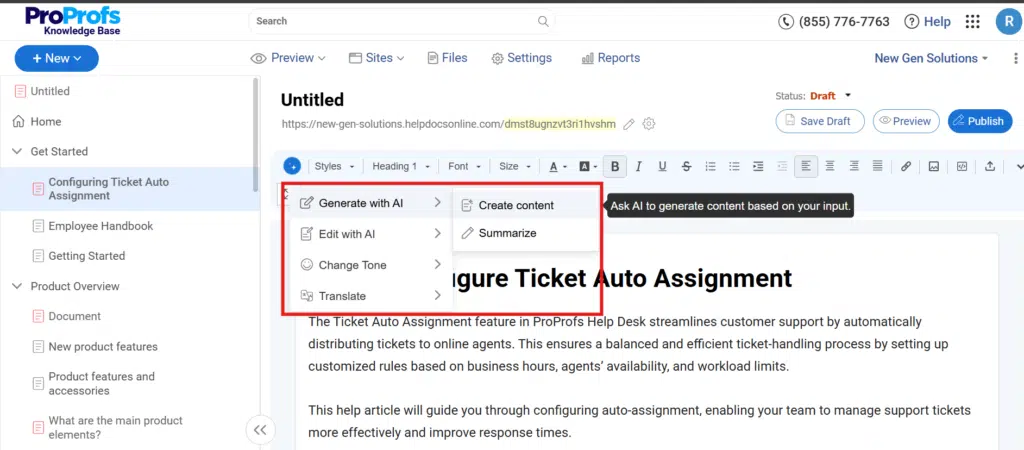
ProProfs Knowledge Base is a user-friendly self-service portal designed to help businesses create knowledge bases, user manuals, guides, and more to enable self-service. It offers an AI Writer that helps create help content quickly and accurately using quick, built-in prompts and quick action buttons, saving hours of manual work.
The built-in WYSIWYG editor provides a real-time preview of content while formatting, ensuring articles look polished before publishing. You can enhance articles with videos, images, and text blocks to improve reader engagement.
The platform also supports content reuse through single sourcing, enabling consistent information across pages. You can create help content in over 90 languages, making it ideal for global teams and customer bases.
Key features of ProProfs Knowledge Base include:
- Custom branding options that let you personalize your help site with your own domain, fonts, themes, and logo.
- User roles and permissions that ensure everyone on your team has the right level of access to create, review, and publish content.
- Flexible workflows and automated notifications that keep your content process smooth and collaborative.
- Enterprise-grade security features such as private sites, IP restrictions, and single sign-on to safeguard sensitive information.
- Insightful reports and analytics that help you track article performance, author contributions, and search trends for ongoing improvement.
6. Zendesk
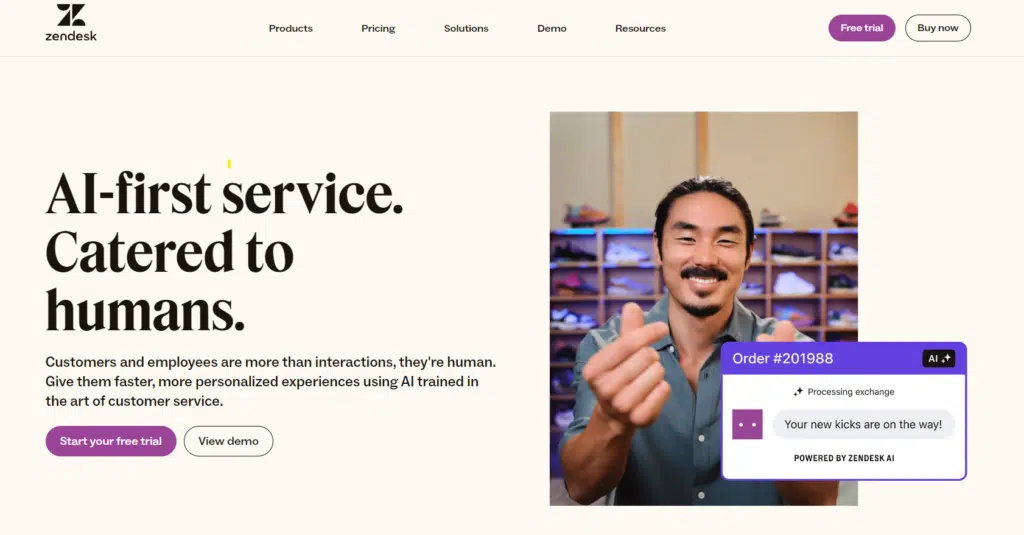
Zendesk‘s self-service platform offers a comprehensive solution for internal knowledge management, designed to enhance employee satisfaction and operational efficiency. By consolidating vital company information into a single, accessible platform, Zendesk empowers employees to find answers independently, reducing the reliance on colleagues and eliminating the chaos of disorganized files.
This digital library, akin to an internal encyclopedia, ensures that all team members have access to consistent and accurate information, fostering a culture of self-sufficiency and collaboration within the organization.
Key features of Zendesk’s self-service platform include :
- Instant search and auto-suggest capabilities, making information retrieval swift and effortless.
- Supports the creation of unlimited articles and provides powerful editing options.
- Enables employees to leave feedback via comments, ensuring continuous improvement of the content.
- Offers advanced security features like single sign-on, roles and permissions, and IP restrictions, ensuring that sensitive information remains protected.
- Allows HR and IT teams to monitor usage patterns and optimize the knowledge base for better performance.
7. Document360
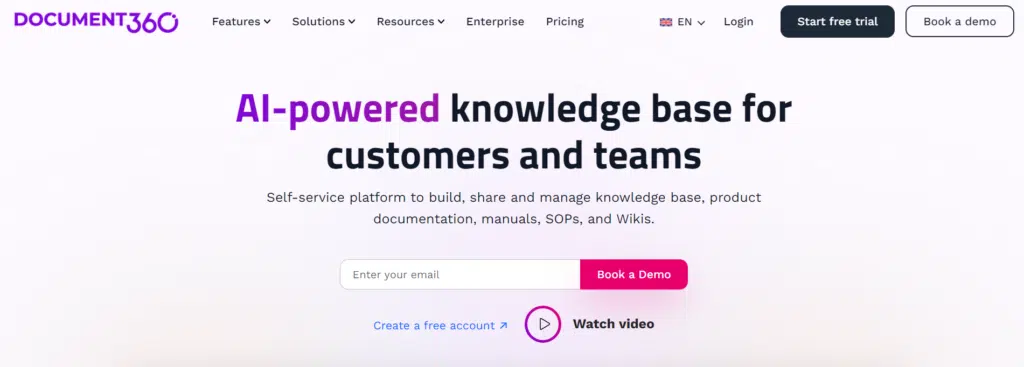
Document360 is a cutting-edge self-service platform designed to streamline the creation and management of knowledge bases, product documentation, manuals, SOPs, and wikis. It offers a user-friendly interface packed with powerful features that make the documentation process effortless and efficient. Trusted by global brands, Document360 is tailored for technical writers, product owners, customer support teams, and developers, helping them scale customer service without increasing support costs.
By providing a comprehensive solution for documentation needs, Document360 ensures that customers can easily find the information they need, enhancing overall user satisfaction and reducing support call volumes.
The platform’s advanced capabilities, such as its robust search functionality, rich analytics, and AI-powered content suggestions, make it an invaluable tool for content creators. With workflows for managing documentation processes, a business glossary for maintaining consistent terminology, and a feedback manager to track user feedback, Document360 significantly improves the efficiency and quality of documentation efforts.
Key features of Document360 include:
- Advanced search to quickly find the right articles on the go.
- Rich analytics to help content producers make data-backed decisions.
- AI-powered suggestions to generate optimal titles and SEO meta descriptions.
- Workflows to manage your documentation workflow processes.
- Feedback manager to track feedback across all articles and categories.
- Over 120 integrations to connect with your business tools.
- 24/7 support for migrating existing documents.
8. Help Scout
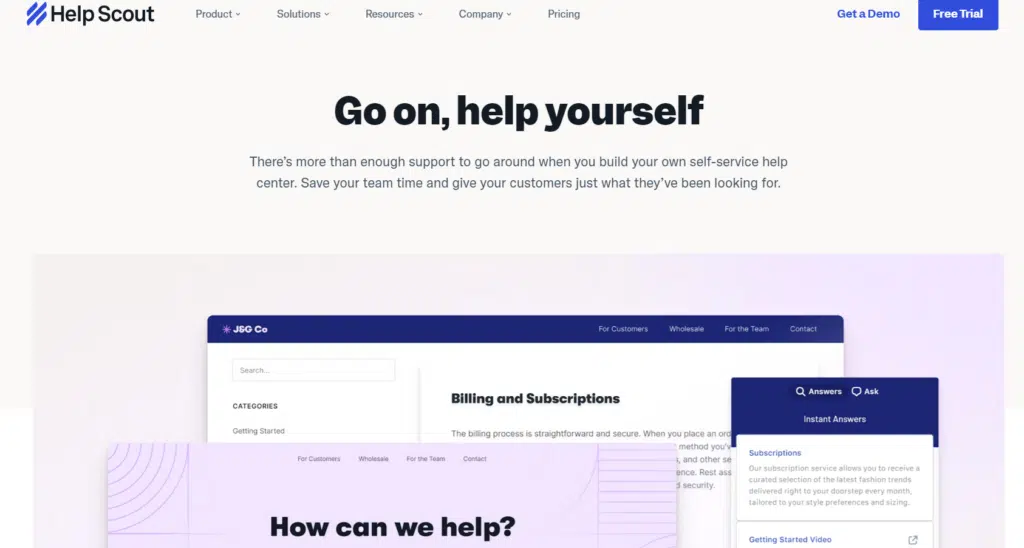
Help Scout’s self-service platform empowers businesses to build their own help centers, saving time and reducing email volume by up to 30%. Designed to be user-friendly, it allows companies to create a professional and functional Docs site without any coding required. Customers can find answers to their questions around the clock. Help Scout brings help articles directly to customers wherever they are, whether on your site or in-app, ensuring they have the information they need exactly when they need it.
You can easily edit, publish, and manage articles, making sure your site looks great on any device. Customization options allow you to set the vibe with various color and formatting choices or even get more advanced with custom CSS. Whether you choose to make your help center public, restrict access, or authorize specific users via the API, Help Scout provides the flexibility to meet your specific needs.
The Docs Report feature gives you valuable insights into customer interactions, helping you identify trending topics, content gaps, and overall customer satisfaction with your documentation.
Key features of Help Scout include:
- Create and manage a help center without any coding.
- Embed help articles anywhere on your site or in-app.
- Provide answers to customer questions 24/7.
- Easily customize your help center with colors, formatting, and CSS.
- Public or restricted access to your help center.
- Analyze visitor numbers, trending topics, content gaps, and article ratings
9. Gorgias

Gorgias’s self-service platform is designed to elevate customer support for ecommerce brands, consolidating all customer interactions into one streamlined hub. By integrating email, chat, social media, and phone channels, Gorgias allows support teams to handle every customer interaction from a single interface. This unified approach not only maximizes efficiency but also enhances customer satisfaction by providing quick and context-rich responses, leveraging complete customer information right at the agents’ fingertips.
Key features of Gorgias’s self-service platform include:
- Automate ticket routing and personalize responses with AI-driven workflows.
- Create an AI-powered help center to answer common questions and reduce helpdesk tickets by 50%.
- Connect over 100 apps to share customer data and streamline updates directly within Gorgias.
- Access comprehensive customer information and previous interactions for context-rich responses.
Summary of the 8 Best Customer Self-Service Portals
Customer Self-Service Portals
Key Features
Desk365
Internal Knowledge Base, Solution Articles, Versions in Knowledge Base, Multi-Brand Knowledge Base, Customer Support Portal
Zoho Desk
AI-powered bots, Customizable support, Multi-Brand Help Center, Community building, Knowledge Base
Freshdesk
Extensive Knowledge Base, AI-Powered Chatbots, Mobile Optimization, AI-Powered Analytics
Bold Desk
Unlimited article creation, Powerful editing capabilities, Multiple languages support, SEO optimization
Zendesk
Instant search, Unlimited articles creation, Feedback management, Security features, Usage monitoring
Document360
Advanced search, Rich analytics, AI-powered suggestions, Workflows, Feedback manager, Integrations, 24/7 support
Help Scout
Create and manage help center, Embed help articles, Customize help center, Public or restricted access, Analyze visitor numbers, trending topics, content gaps, and article ratings
Gorgias
Automate ticket routing, AI-powered help center, Connect over 100 apps, Access comprehensive customer information
Benefits of a self-service portal
A self-service portal offers numerous benefits for both businesses and customers.
1. Enhances agent productivity
It enhances agent productivity by enabling customers to solve their problems, which frees up customer service reps to tackle more complex issues, thereby significantly increasing overall efficiency.
2. Improves customer satisfaction
Customer satisfaction is improved as customers enjoy the independence of resolving issues themselves, which minimizes frustration and provides immediate solutions.
Recommended Reading: 10 Ways to Deliver Good Customer Service in a Ticketing System
3. Strengthens brand reputation
The portal strengthens brand reputation by empowering customers and showcasing the business’s respect for their time, fostering trust and loyalty.
4. Offers 24/7 support
Additionally, it offers 24/7 support through knowledge-base articles and forums, ensuring round-the-clock assistance without the need for extra staffing.
5. Educates customers
It also educates customers with comprehensive resources such as step-by-step instructions, how-to videos, and guides, making them more knowledgeable and proficient with the products or services.
A customer self-service portal enhances productivity, customer satisfaction, brand reputation, and accessibility while educating users. Desk365 integrates these advantages seamlessly into its platform, offering businesses a robust knowledge base solution to manage customer support efficiently. By adopting Desk365, companies can leverage the power of self-service to transform their support operations, ensuring they meet the evolving needs of their customers while maintaining high standards of service and efficiency. Embrace Desk365 to provide exceptional support, strengthen your brand, and drive business growth.
Frequently asked questions
A customer self-service portal is an online platform that lets users resolve their issues independently by accessing resources like knowledge bases, FAQs, and support ticket management tools.
Self-service portals empower users to solve issues quickly by offering instant access to solutions, reducing frustration and the need to contact support.
Yes, self-service portals decrease the volume of support tickets, allowing businesses to optimize team size and lower operational costs.
Absolutely! Desk365’s support portal is fully customizable to match your brand guidelines and offer a cohesive user experience.






